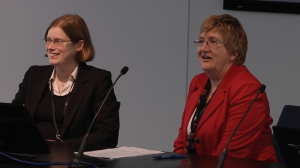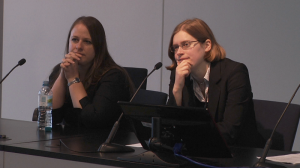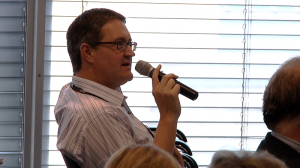Responses
Chris Bird (Senior Legal Counsel at the Wellcome Trust) – hereinafter (CB)
Susan Corrigall (Copyright Officer at the National Records of Scotland) – hereinafter (SC)
Ronan Deazley (Professor of Copyright Law, University of Glasgow) – hereinafter (RD)
Christy Henshaw (Digitisation Programme Manager at the Wellcome Library) – hereinafter (CHen)
Caroline Herbert (former Content and Metadata Officer at the Wellcome Library) – hereinafter (CHer)
Lesley Richmond (University Archivist and Deputy Director, University of Glasgow Library) – hereinafter (LR)
RD: So, you now know who told me that copyright made their job impossible. One of the things I wanted to do when I was organising this event with Sue Davis and Wellcome was to take huge advantage of Wellcome's excellent catering facilities, so we've folded in as many tea breaks and coffee breaks as I thought was decent. We have a couple of minutes before we're going to break for tea and coffee and then we come back at 11:15. There will be a Q and A session at the end of the next panel after Victoria Stobo speaks, and all of our current panellists will also be involved in that Q and A session, so there will be opportunities both to talk to them over tea and coffee, and ask questions at that stage, but perhaps if anyone has a burning question that they must ask now, before we break for tea and coffee, I'm quite happy to take some of that. We do have some roving mics and if you've got questions throughout the day, please self- identify yourself and the institution that you represent before you ask your question, and that will help in terms of producing a transcript and producing a set of digital proceedings.
CB: Chris Bird, Senior Legal Counsel at the Wellcome. I've got a question for you and I'm sorry I don't remember your name and I don't have a programme because I came in late.
LR: Lesley.
CB: I got the very strong impression that you were initially sceptical, subsequently relieved about putting the contract in place about the fact that the copyright issues were dealt with to your institution’s satisfaction, but I still get the sense a little bit that you feel that the copyright issues remain and the fact that your institution’s copyright issues were dealt with you're happy with. And I just wondered what your sense was at the end of this was whether we've just been lucky that we haven’t had more in the way of take-down and objection or whether this was a well managed process and is reproducible with other projects.
LR: It was a well run project and the processes that have been put in place can have the same results elsewhere. I think from what Caroline said as well is that most people don't understand copyright anyway and they're astonished that you have to ask them permission to do this. Those people who understand copyright for commercial purposes and that's where I now know I've got a very large appetite for risk [laughter] but if you have spent a lot of money creating something then you should be protected from that, I would agree with that. But archives on the whole are material that were not created themselves for commercial gain, it's just you going about your normal business. So copyright… it was comforting that Wellcome has taken the liability so that’s a relief and I think this project is a way to demonstrate going forward that no damage has been done so can we please change copyright law.
CB: Okay thank you that's useful and we were very concerned about copyright liability and we didn't know what our risk appetite was either. We just formed a view as we went along.
LR: That's it you just know that copyright exists and then you speak to people who are professors of copyright law and you get more concerned. It's very good when they suddenly say we must do something about this for you. So more copyright lawyers should become archivists, as a career break, then they'll understand.
RD: As a Venn diagram there aren't many people sitting around [inaudible 51:14], not in the UK. Thanks very much for your question. Anyone else? Yes, we've got one at the back and then we'll break for tea and coffee, and nice pastries.
SC: Hello this is a question for Caroline really, Susan Corrigall, Copyright Officer at the National Records of Scotland. I must say that I was very, very impressed at your hit rate at tracking down the copyright holders, eighty plus percent. What I would be interested in is that you spoke about the Wellcome had worked out the list of sources which they felt constituted a diligent search, is it possible at all to give any indication of the time which it took to trace the copyright holders, to do your reverse genealogy?
CHer: Short answer not really because it did vary a lot. The sources were things like Who's Who and then if we thought there was a literary estate then the WATCH File which people may or may not be familiar with which lists contacts there. I feel slightly bad saying this as a trained librarian but things like Google and Wikipedia with the obvious caveat that, that wasn't the only source but it was things like that where you'd maybe build up a picture. If Wikipedia tells you that these are the names of the children then you search the names of the children in Who's Who or something and see if it tells you that their father was the person that you think it was and put it all together. Because obviously if you get nothing back then it doesn't take long but I honestly, I mean it could have been an hour or two maybe for those that were more difficult to find or when you weren't getting anything back, sorry that's a very long way of saying I'm not sure I can really put a figure on it because some were very quick and some took a lot longer.
SC: How long were you working on finding the copyright if you could say, was it a two year project how many weeks, months?
CHen: We didn't work intensively in copyright the entire time though.
CHer: No, I was juggling it with other things, so.
CHen: And also we had a big push to find a lot of people, send off a bunch of letters, and then wait and do nothing. And then things come back and they suddenly start going oh can we have copies or our fifty letters and so that added up time.
CHer: I can tell you that if someone's got a list of about twenty files that there are letters in and you end up with the copies about an inch thick going in to the envelope, that takes at least a day, maybe more.
RD: I think one of the things to appreciate about Codebreakers is it was never a project that was designed to study rights clearance - that was not part of the brief at the start. It was when we came in and said oh, you're doing amazing things here, let's think about the implications for rights clearance and times and costs and making life easier but that again we'll talk about next steps at the end. But I think anybody, any archivist in the room who's contemplating any kind of digitisation project that is one of the things that you might think about tracking, because that's really useful information, really useful evidence that helps us begin to think about what copyright policy should be in this space. So if there are fudgy answers here it's because they just weren't thinking about this stuff at the start.
CHen: And also we're kind of pre-limiting ourselves to those who are already easier to find. If we'd suddenly opened up the floodgates and said we're going to trace every single John Smith...
LR: It makes your job impossible.
CHen: It would be infinite.
RD: Okay thank you very much for your questions. Let's take a break, we reconvene at quarter past. We'll have a second panel, which is Victoria providing some reflections on the Codebreakers project and then a general Q and A about the nature of risk and what are appropriate risk criteria for archivists to think about when you're doing something like this. Thank you very much.
To leave feedback on the discussion within this Q&A session, click here.

